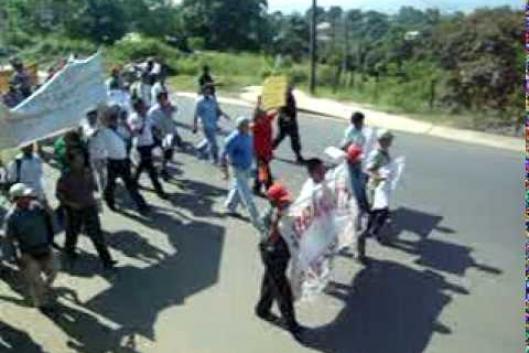The forest is not for sale! The forest must be defended! This is the clamour in the district of Barranquita, Province of Lamas in the San Martin region. The property rights acquired by the inhabitants of the hamlets in the Caynarachi river basin, located in the Peruvian Amazon, over the land they work have been violated. These people have been real guardians of the forest, looking after -on their own plots- its immense wealth in flora, fauna and water resources.
In spite of this, in mid-2006, the State allocated 7,000 hectares to the Agropecuaria del Shanusi Company, a member of the Romero group, for the establishment of monoculture oil palm plantations that had been declared of national interest. There are hundreds of landholders (posesionarios) who have been waiting for years for the land tenure deeds. They are being denied these deeds under the excuse that the company has requested the land and that the inhabitants have only worked a small area – because they are conserving a lot of primary forest!
The company started the work of preparing the land by deforesting practically the whole area to establish a monoculture oil palm plantation. According to the Servindi news agency (1), at the end of 2009, the company hurriedly built “a track for vehicles, crossing the whole piece of land known as Palmas del Oriente, extracting non-metals from the Lorocache hill, diverting the course of streams, drying up some water courses springing from the Lorocache hill and taking over an enormous lake called Cocha Muerta, where they have put up a ‘Private Property’ sign. All this has been done without the legal authorizations from the relevant government bodies and, in addition, a large amount of timber has been removed.”
Hundreds of labourers are working with chainsaws, machetes, axes and tractors, helicopters overfly the area and security personnel guard it. “There are over 50 chainsaw operators and thugs carrying out actions in the forest. Barranquita is ready for an uprising and could become the next Bagua,” (see WRM bulletin 142 for details on the Bagua uprising) warned the mayor of the San Martin region, César Soria, who denounced that the owners of the companies have left hundreds of hectares of land devastated and water courses filled in by the work of tractors and other heavy machinery, displacing communities and compromising their free passage. (2)
Making use of a new citizen’s arrest law, the company devastated the peasant farmers’ crops and housing in addition to mistreating and arresting some of them. According to Servindi, one of the peasant farmers was imprisoned for a month and is still under subpoena.
All these manoeuvres have forced some inhabitants to sell their lands and leave, but mass protests have also taken place. In 2008, the residents of Barranquita filed for precautionary measures to avoid one of the Romero Group companies (Agricola de Caynarachi S.A.) from entering the area. Protected by Law No. 653 for the promotion of investment and without prior consultation with the communities, by Ministerial Resolution No. 255 – 2007, the Government allocated the company 3,000 hectares known as “Palma de Oriente,” for the industrial production of oil palm. This involved paralysing the development plans undertaken by the Barranquita Coordination Board for the Struggle against Poverty (Mesa de Concertación de Lucha contra la Pobreza de Barranquita) in addition to affecting primary forest and the boundary lines of various Barranquita annexes located on the banks of the Caynarachi river. (3)
The company’s activities devastated communal forests and violated the peasants’ rights in the communities of the District of Barranquita. The population is demanding the granting of property deeds and the cancellation of the contract established with the company for the allocated area.
On 7 January, the indignation of the peasant farmers in the area over the violation of their rights and the destruction of the district’s primary forests – the few left in the region – led to a great march and demonstration. The Barranquita Resistance Committee expressed its protest against the Romero Group and against the concessions granted by the central Government and reaffirmed “its option to defend its citizens’ rights and the environment and all its biodiversity; no company shall enter its territory without prior consent.” (4)
(1) “Peru: Denuncian crimen ecológico del Grupo Romero en Barranquita, bajo Huallaga, San Martín”(Ecological crime committed by the Romero Group in Barranquita, baja Huallaga, San Martin) , by Barranquita Resiste, 23 December 2009, Servindi, http://www.servindi.org/actualidad/20681
(2) “Autoridades y dirigentes de Barranquita anuncian protestas para proteger sus bosques” (Authorities and leaders of Barranquita announce protests to protect their forests), Inforegión, 4 January 2010,http://www.inforegion.pe/portada/45514/autoridades-y-dirigentes-de-barranquita-anuncian-radicalizacion-de-protestas-para-proteger-sus-bosques/
(3) http://barranquitaperu.blogspot.com/2008_09_01_archive.html
(4) Mobilization of leaders in San Martín, 7 January 2010,Gu7SQBwc-lQ&feature=youtube_gdata">
